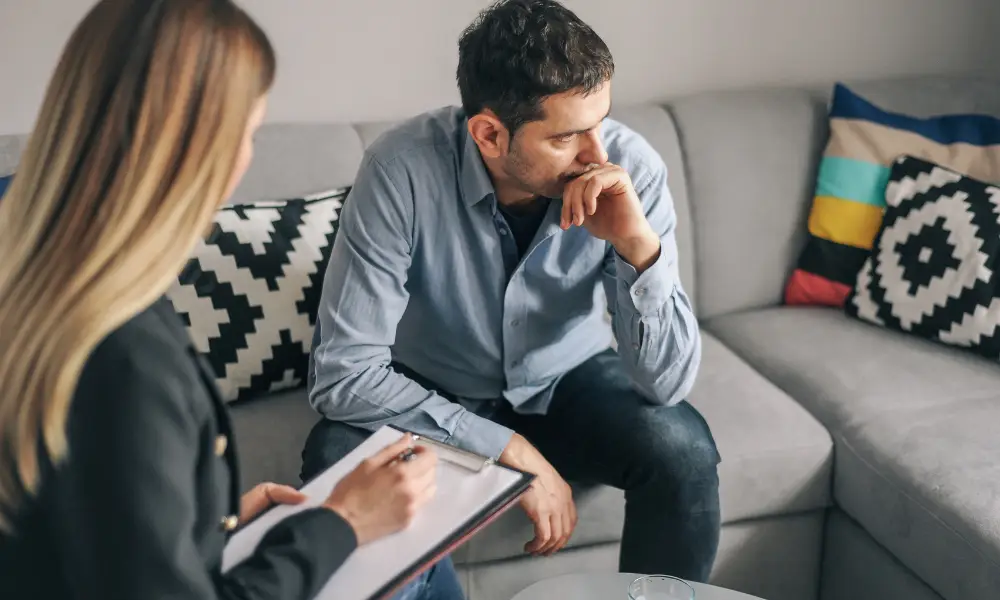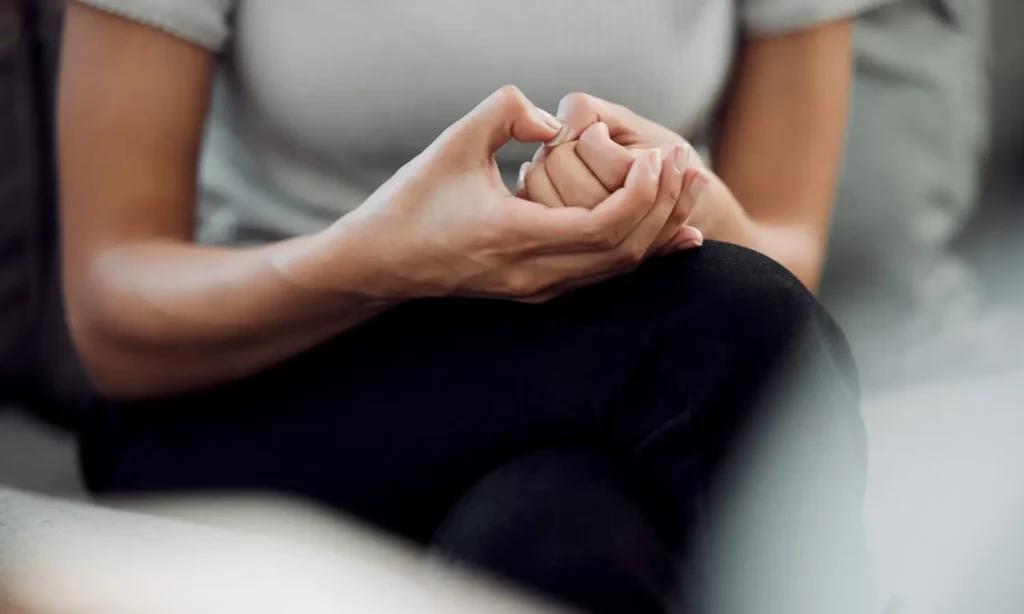Have you ever felt your heart racing, palms sweating, and a surge of overwhelming panic, seemingly out of nowhere? If yes, then you’ve touched the edges of acute anxiety, a challenging beast that can disrupt your daily life without warning. But here’s the good news: you’re not alone, and there are effective treatments out there that can help you regain control. This blog is your safe space, a guide tailored to help you navigate through the storm of acute anxiety, and discover the treatment options that best suit you.
We’ll delve deep into understanding your symptoms, explore various treatments from professional help to natural remedies, and even talk about the role of medication. So, take a deep breath, and let’s embark on this journey together.
Contents
Identifying Your Acute Anxiety Symptoms
Knowing when acute anxiety is creeping up on you can be tricky. It’s a bit like a chameleon, blending into different aspects of your life until it suddenly becomes overwhelming. But, by becoming familiar with its symptoms, you can catch it early and take control. Let’s talk about how to identify these signs and understand what your body and mind are telling you.
Physical Signs: Your Body’s Red Flags
 Acute anxiety often shows up first in your body. You might notice your heart pounding hard in your chest, or your breathing might become fast and shallow. For some, it can even feel like you’re having a heart attack. These are your body’s alarm bells, telling you that something is not right.
Acute anxiety often shows up first in your body. You might notice your heart pounding hard in your chest, or your breathing might become fast and shallow. For some, it can even feel like you’re having a heart attack. These are your body’s alarm bells, telling you that something is not right.
- Rapid Heartbeat: Your heart might start racing, and you can sometimes feel it in your throat or your chest.
- Shortness of Breath: It might become hard to breathe, and you could feel like you are gasping for air.
- Trembling or Shaking: Your hands, legs, or your entire body might start to shake uncontrollably.
- Sweating: Even if it’s not hot, you might find yourself sweating profusely.
- Dizziness: A feeling of lightheadedness or being unsteady on your feet can occur.
Emotional Signs: The Mental Turmoil
Acute anxiety is not just a physical experience; it’s an emotional storm. You might find yourself feeling suddenly scared or panicked, without any clear reason why.
- Intense Fear or Discomfort: This can hit you out of the blue, creating a sense of immediate danger.
- Feeling of Losing Control: You might feel like you’re spiraling, unable to stop the rush of anxiety.
- Irritability: Small things might suddenly set you off, making you unusually angry or upset.
- Difficulty Concentrating: Your mind might become foggy, making it hard to think straight.
Behavioral Signs: How You React
When acute anxiety hits, it can change how you act. You might find yourself avoiding certain places or situations, hoping to prevent another anxiety attack.
- Avoidance: Steering clear of places or situations that you think might trigger anxiety.
- Seeking Reassurance: Constantly asking others if everything is okay can be a sign that you’re struggling.
Exploring Various Treatment Options To Manage Acute Anxiety
When it comes to tackling acute anxiety, understanding the array of treatment options available is like having a map in your hands. You’re no longer wandering in the dark; you have directions and choices. So, let’s explore the different treatments that will help you make an informed decision on your journey to calmness.
Medication: A Helping Hand
 For some, medication can be a crucial part of managing acute anxiety. It’s like a lifebuoy thrown into stormy waters, providing immediate support.
For some, medication can be a crucial part of managing acute anxiety. It’s like a lifebuoy thrown into stormy waters, providing immediate support.
- Anti-Anxiety Medications: These are specifically designed to alleviate anxiety symptoms quickly. They can help to calm your mind and reduce physical symptoms.
- Antidepressants: Often used for long-term anxiety management, these medications can help to balance chemicals in your brain that are linked to anxiety.
However, it’s important to have an open and honest conversation with your healthcare provider about potential side effects and finding the right medication for your specific needs.
Therapy: Building Your Toolkit
Therapy is like having a skilled guide by your side, helping you navigate through the turbulent waters of acute anxiety, and equipping you with strategies to manage it.
- Cognitive Behavioral Therapy (CBT): This is a popular and effective form of therapy that focuses on identifying and challenging negative thought patterns and behaviors.
- Exposure Therapy: This involves gradually facing and overcoming your anxiety triggers in a safe and controlled environment.
Natural Remedies and Lifestyle Changes: Cultivating Calmness
 For those looking to complement their treatment plan or seeking alternative options, natural remedies and lifestyle changes can play a significant role.
For those looking to complement their treatment plan or seeking alternative options, natural remedies and lifestyle changes can play a significant role.
- Mindfulness and Meditation: These practices can help to ground you, bringing a sense of calm to the storm in your mind.
- Exercise: Regular physical activity has been shown to reduce anxiety and improve mood.
- Adequate Sleep: Ensuring you get enough rest is crucial, as lack of sleep can exacerbate anxiety symptoms.
- Balanced Diet: Eating a healthy diet can support your overall well-being, including your mental health.
The key to effective acute anxiety treatment is finding what resonates with you. Remember, what works for one person may not work for another. So, don’t be discouraged if the first thing you try doesn’t yield results immediately. It might take some time and experimentation, and that’s okay.
How to Reduce Anxiety Immediately at Home?
 When anxiety strikes unexpectedly, having quick and effective strategies to calm yourself can make a world of difference. Here’s a concise guide on how to reduce anxiety immediately in the comfort of your home:
When anxiety strikes unexpectedly, having quick and effective strategies to calm yourself can make a world of difference. Here’s a concise guide on how to reduce anxiety immediately in the comfort of your home:
- Deep Breathing: Take slow, deep breaths. Inhale for a count of four, hold for four, and exhale for four. This helps activate your body’s relaxation response.
- Progressive Muscle Relaxation: Tense and then slowly release each muscle group, starting from your toes up to your head.
- Focus on Your Senses: Engage your senses. Listen to calming music, smell your favorite fragrance, or feel the texture of an object.
- Positive Visualization: Close your eyes and visualize a place or situation where you feel safe, happy, and relaxed.
- Use Grounding Techniques: Name five things you can see, four things you can touch, three things you can hear, two things you can smell, and one thing you can taste.
- Practice Mindfulness: Bring your attention to the present moment. Focus on your breathing and observe your thoughts without judgment.
- Limit Stimulants: Avoid caffeine and sugar as they can increase anxiety levels.
- Reach Out: Talk to a trusted friend or family member about how you’re feeling.
Implementing these strategies can provide immediate relief, helping you regain a sense of calm and control over your anxiety. Remember, these are temporary solutions, and seeking professional help for ongoing anxiety is crucial.
The Role of Professional Help in Treating Acute Anxiety
 When acute anxiety starts to feel like an unmanageable storm in your life, reaching out for professional help can be the beacon of light guiding you to safer shores. Let’s delve into why seeking the expertise of therapists or psychologists is so crucial and how they play an indispensable role in managing and overcoming acute anxiety.
When acute anxiety starts to feel like an unmanageable storm in your life, reaching out for professional help can be the beacon of light guiding you to safer shores. Let’s delve into why seeking the expertise of therapists or psychologists is so crucial and how they play an indispensable role in managing and overcoming acute anxiety.
- Expert Insight: Professionals have a deep understanding of anxiety disorders, providing valuable insights into your symptoms and experiences.
- Personalized Strategies: They can tailor coping strategies and therapeutic techniques to suit your unique needs, helping you regain control.
- A Safe Space: Therapy provides a confidential and supportive environment where you can openly express your thoughts and feelings without judgment.
- Therapeutic Approaches Tailored to You: There are various therapeutic approaches available, and a professional can help determine the most effective strategy for your specific situation.
- Regular Monitoring: Professionals monitor your progress and make necessary adjustments to your medication as needed.
- Access to Additional Resources: Professionals have a wealth of knowledge about additional resources and tools that can aid in your recovery.
Reaching out for professional help is a sign of strength and a proactive step towards reclaiming your life from acute anxiety. It’s about arming yourself with the support and tools necessary to navigate through the storm and find your way back to calmness.
Exploring Therapy Options for Acute Anxiety

Navigating through the world of therapy options can feel like exploring a vast, unfamiliar terrain. However, when it comes to treating acute anxiety, there are tried-and-tested paths that have helped countless others find their way to calmness and stability. Let’s delve into various forms of therapy that have proven effective in treating acute anxiety, helping you understand which might be the best fit for your journey.
Cognitive-Behavioral Therapy (CBT)
CBT stands out as one of the most effective and widely used therapies for anxiety. It’s like having a toolbox that helps you dismantle and rebuild your thought patterns for a more stable foundation.
- Identifying Negative Thoughts: Learn to recognize and challenge anxiety-inducing thought patterns.
- Developing Coping Strategies: Equip yourself with practical tools to manage and reduce anxiety symptoms.
Exposure Therapy: Facing Your Fears Safely
Exposure therapy is about gradually and safely confronting the things that trigger your anxiety, reducing their power over time.
- Controlled Exposure: With the guidance of a therapist, you are gradually exposed to anxiety triggers in a controlled environment.
- Building Resilience: Over time, this practice helps reduce the fear and anxiety associated with these triggers.
Mindfulness and Relaxation Techniques
Mindfulness practices offer a way to ground yourself, bringing you back to the present moment and away from the overwhelming swirl of anxiety.
- Breathing Exercises: Learn to focus on your breath, slowing down your heartbeat and calming your mind.
- Mindfulness Meditation: Practice being in the present moment, observing your thoughts without judgment.
Acceptance and Commitment Therapy (ACT)
ACT encourages individuals to accept their thoughts and feelings rather than fighting against them, fostering a healthier relationship with anxiety.
- Acceptance: Learn to accept your anxiety symptoms as they are, reducing the struggle against them.
- Committed Action: Develop a clear set of values and commit to actions that align with those values, regardless of how you’re feeling.
Dialectical Behavior Therapy (DBT)
DBT provides tools for tolerating distress, managing emotions, and improving relationships, which can all contribute to reducing anxiety.
- Distress Tolerance: Build skills to withstand and navigate through intense emotional moments.
- Emotional Regulation: Learn strategies to manage and reduce the intensity of your emotions.
Just as every individual is unique, so is their experience with acute anxiety. What works wonders for one person may not be as effective for another. It’s essential to keep an open mind and be willing to explore different therapy options, guided by the expertise of mental health professionals.
Conclusion
Acute anxiety can feel like a relentless storm, but remember, you have the power to navigate through it and find your calm. Throughout this guide, we’ve explored various aspects of acute anxiety and delved into numerous treatment options, therapies, and self-help techniques designed to empower you on your journey to recovery.
If you are experiencing anxiety-related issues and are ready to take the next step toward recovery, Online Anxiety Counseling at TherapyMantra is here to support you. Our experienced therapists specialize in anxiety treatment and are dedicated to providing you with the tools and support you need, all from the comfort of your own home.
Book a trial Online therapy session today, and embark on your journey to calmness and well-being. You’re not alone, and help is just a click away.


